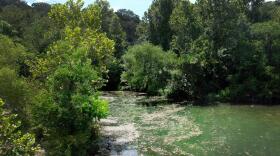Remember last year, when we only had to worry about dog-killing algae?
Well, on top of the pandemic, Austinites also still have to worry about dangerous algal blooms in local waterways.
As summer heats up, the City of Austin is warning pet-owners to be mindful of blue-green algae that forms in places like Red Bud Isle, Lady Bird Lake and the Barton Springs pool spillway. Those blooms were reportedly responsible for the deaths of a handful of dogs last year.
Scientists from the city's Watershed Protection Department will begin weekly testing at hotspots in July, the city tweeted today. The testing will continue through the fall, when things cool down and blooms typically die out. This year, the city has extended and expanded upon its agreement with UT Austin to test the algae. Scientists hope the data from last year will inform this year's testing, allowing officials to more quickly determine whether blooms are toxic or not.
It's important to note the algae itself isn't innately harmful; it's the bacteria that gloms on to the algae, known as cyanobacteria. It can kill pets shortly after exposure, as well as cause skin irritation in humans.
RELATED | Here's What You Need To Know About The Toxic Algae Blooms On Lady Bird Lake
Austin's historically hot and dry summers create the perfect conditions in which the algae can form.
The oppressive heat warms waterways, and the lack of rain keeps them stagnant, allowing the blooms to form. But that's not the only factor at play. Upstream runoff from the Highland Lakes helps provide the perfect food source for the cyanobacteria to form, and zebra mussels in Austin's waterways help clarify the water, giving blooms more sunlight. While the blooms don't typically spread quickly, they may worsen as the earth's atmosphere heats up as a result of climate change. The blooms typically occur later in the summer.
Last year, officials first warned of the toxic algae in early August, when a dog reportedly died at Red Bud Isle after coming into contact with the algae. That prompted the closure of the dog-friendly spot along Lady Bird Lake. Toxins at Red Bud subsided finally in early November and it officially reopened shortly before Thanksgiving.
Got a tip? Email Andrew Weber at aweber@kut.org. Follow him on Twitter @England_Weber.
If you found the reporting above valuable, please consider making a donation to support it. Your gift pays for everything you find on KUT.org. Thanks for donating today.





